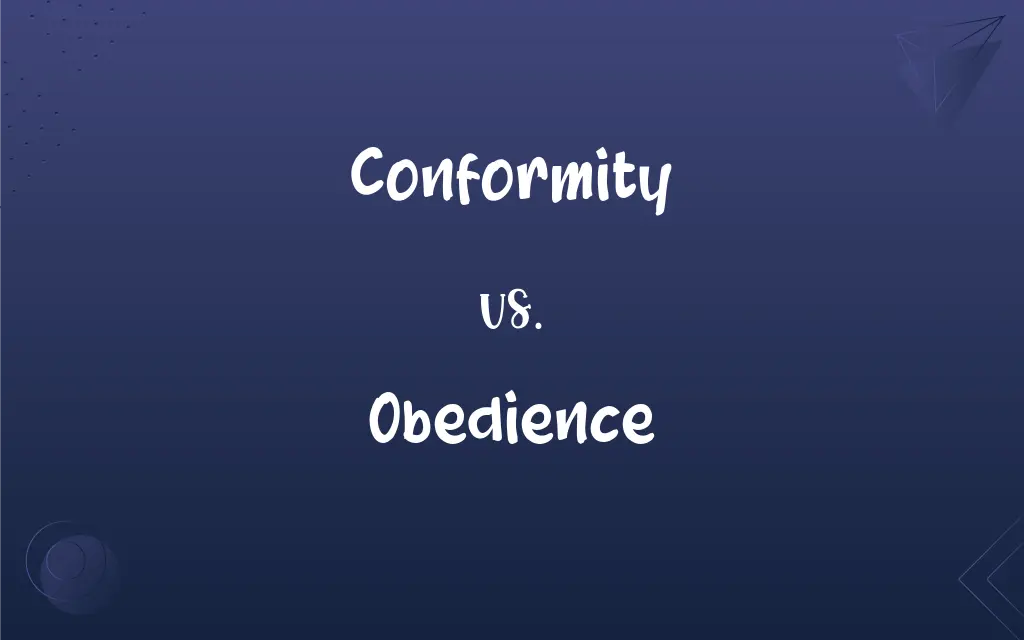Conformity vs. Obedience: What's the Difference?
Edited by Aimie Carlson || By Janet White || Published on January 7, 2024
Conformity refers to adjusting behaviors or attitudes to align with social norms or group standards, while obedience involves following orders or rules set by an authority.

Key Differences
Conformity is the process of adapting one's behaviors and attitudes to match those of a group or societal norms. Obedience, in contrast, is the act of following the instructions or commands of someone in authority.
Conformity is often driven by the desire to fit in or be accepted by peers. Obedience, however, is motivated by the recognition of authority and often involves a hierarchical relationship.
In conformity, the influence is usually indirect and can be a result of perceived social pressure. In obedience, the directives are explicit and come from a defined authority figure.
Conformity can occur within a group without any explicit requests or commands. Obedience specifically involves complying with direct orders or rules.
The consequences of not conforming are usually social, like exclusion or disapproval. Non-obedience to authority can result in more formal penalties or punishments.
ADVERTISEMENT
Comparison Chart
Driving Factor
Social acceptance, peer pressure
Authority, hierarchical instruction
Nature of Influence
Indirect, often unspoken social norms
Direct, explicit commands or rules
Motivation
Desire to fit in, be accepted
Acknowledgement of authority, compliance
Type of Relationship
Peer-to-peer or within a social group
Hierarchical, between authority and subordinate
Consequences
Social disapproval, exclusion
Formal penalties, punishment
ADVERTISEMENT
Conformity and Obedience Definitions
Conformity
Adapting one's actions to align with group behavior.
There's a high level of conformity in religious rituals.
Obedience
Compliance with rules or orders.
Obedience to traffic laws is essential for safety.
Conformity
Changing one's behavior to fit in with a group.
Her conformity was evident in her quick adoption of the team's methods.
Obedience
Following the instructions or commands of a higher authority.
His obedience to the company's policies was exemplary.
Conformity
The tendency to act similarly to others in a group.
Conformity in social media behavior is often driven by popularity.
Obedience
Adhering to instructions from someone in control.
Obedience in the classroom is important for maintaining order.
Conformity
The act of matching attitudes and behaviors to group norms.
His conformity to the company culture was noticeable.
Obedience
Submission to authority.
The soldiers showed strict obedience to their commanding officer.
Conformity
Compliance with social standards and practices.
Conformity in fashion trends is common among teenagers.
Obedience
The act of obeying or being dutiful.
Her obedience to her parents' wishes was a sign of respect.
Conformity
Similarity in form or character; agreement
I acted in conformity with my principles.
Obedience
The quality or condition of being obedient.
Obedience
The act of obeying.
FAQs
What does obedience mean?
Obedience is following orders or rules set by an authority.
Can conformity occur without external pressure?
Yes, it can be a personal choice to fit in with a group.
What is conformity?
Conformity is adjusting behaviors and attitudes to align with group norms.
Are conformity and obedience always voluntary?
Conformity is often voluntary, while obedience may be less so due to the authority involved.
Is obedience only applicable in strict hierarchies?
Primarily, but it can also occur in less formal authority relationships.
Is peer pressure a form of conformity?
Yes, it's a common social influence leading to conformity.
Does obedience require an authority figure?
Yes, obedience typically involves a recognized authority.
Does conformity always imply a change in belief?
Not necessarily; it can be a superficial change in behavior.
Are there positive aspects of conformity?
Yes, it can promote social harmony and group cohesion.
Is blind obedience always expected in military contexts?
Not blind obedience; ethical considerations are also important.
Can conformity lead to negative outcomes?
Yes, like losing individuality or perpetuating harmful norms.
How does conformity affect personal identity?
It can sometimes suppress individual expression in favor of group norms.
Are there laws enforcing obedience?
Yes, in many societal contexts, like obeying legal statutes.
Can obedience be harmful?
Yes, if it leads to following unethical or harmful orders.
Can conformity be unconscious?
Yes, individuals may conform without conscious awareness.
Is obedience always a sign of respect?
Often, but it can also stem from fear or compulsion.
Can conformity be seen in animals?
Yes, particularly in social species that follow group behaviors.
How does social media influence conformity?
It often amplifies it through the widespread sharing of norms and trends.
Is obedience important in all societies?
It's valued differently across cultures but generally seen as important for social order.
Is non-conformity always rebellious?
Not necessarily; it can also be a form of personal expression or innovation.
About Author
Written by
Janet WhiteJanet White has been an esteemed writer and blogger for Difference Wiki. Holding a Master's degree in Science and Medical Journalism from the prestigious Boston University, she has consistently demonstrated her expertise and passion for her field. When she's not immersed in her work, Janet relishes her time exercising, delving into a good book, and cherishing moments with friends and family.
Edited by
Aimie CarlsonAimie Carlson, holding a master's degree in English literature, is a fervent English language enthusiast. She lends her writing talents to Difference Wiki, a prominent website that specializes in comparisons, offering readers insightful analyses that both captivate and inform.







































































